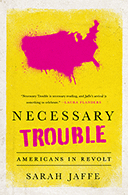I am used to calling Jacob Swenson-Lengyel, of People’s Action, when I need to know what kind of trouble is being stirred up across the country. Their work is featured across Necessary Trouble, and so it was great fun to let Jacob turn the tables and interview me about the book for the Campaign for America’s Future blog.
An excerpt, but you should read the whole thing:
You write in the book that “Class is not simply one of a list of possible identity categories. It is a relation of power that is shaped in part by race; in part by gender, sexual orientation, and gender identity; and by immigration status, education and even region.” Can you say more about the importance of this intersectional understanding of class and why it’s important for social movements today?
One of the things that annoyed me this election season was this tendency to talk about economic issues as if they only affect white people. In fact, it’s quite often the opposite. . . . If you’re a woman, you make less money. We talk about women making 77 cents on dollar, but actually Latinas make 55 cents to every white man’s dollar and black women make 60 cents. These are in fact things that are shaped by your race and your gender.
We can’t talk about class as an identity that only white people have. There’s this weird perception that if you like NASCAR and wear a trucker hat, then that makes you working class. And if you are a mother of three who works cleaning hotel rooms every night and is trying to get your kids through school and feed them, that you’re not somehow working class.
These are the things that shape your class position, because class is not a baseball cap. It’s power.
